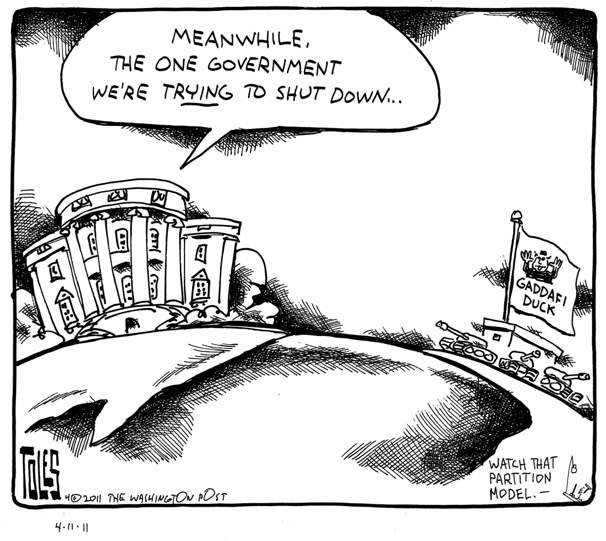Government Shutdown Part Deux?
Over at The Washington Post, Ted Toles nails it.

Over at The Washington Post, Ted Toles nails it.

This past Thursday, a young gunman entered a school in Realengo, a neighborhood in Rio, and killed 12 young students. The story has dominated the pages of Brazil’s newspapers and the coverage of its television stations.
And it led to protests in favor of disarming the Brazilian people.
My sympathies go out to those who lost loved ones and to those injured in the gunman’s mindless rampage. That said, this bumper sticker never spoke more sense, even in Brazil:

Gary Becker, George Schultz, and John Taylor have a plan to bust the budget. It’s worth reading. To me the most obvious gem in the plan, and the one most sorely missing in all the talk in Washington right now is this:
Assurance that the current tax system will remain in place—pending genuine reform in corporate and personal income taxes—will be an immediate stimulus.
Congress and the President (any Congress and any President) have used the tax code to implement policy choices. It’s time to leave the rules be, so that business can plan, something they are loathe to do when there’s no promise that the rules won’t change next week.
Joseph Felter and Brian Fishman, in Foreign Affairs, pose the following question:
Libya contributed hundreds of the fiercest foreign fighters to Iraq’s al Qaeda-led insurgency. Should Washington be worried that it’s now backing these guys against Qaddafi?
So what’s the difference between slavery in the pre-Civil War U.S. and a foreign policy that would prop up a dictator like Mubarak or the Shaw or Marcos because he was friendly to U.S. interests in the region, even though he abused the people of his country? To my mind, in both cases innocent people were being severely abused, even killed. In both cases, people in power ignored the abuse because it benefited their interests. In both cases, the people in power had the resources to stop the abuse.
Elites. Can’t help themselves. Mark Bittman is at it again. If the government gets something wrong–defined as, something Bittman doesn’t like–well give ’em another bite at the organically grown apple:
Agricultural subsidies have helped bring us high-fructose corn syrup, factory farming, fast food, a two-soda-a-day habit and its accompanying obesity, the near-demise of family farms, monoculture and a host of other ills.
Yet — like so many government programs — what subsidies need is not the ax, but reform that moves them forward. Imagine support designed to encourage a resurgence of small- and medium-size farms producing not corn syrup and animal-feed but food we can touch, see, buy and eat — like apples and carrots — while diminishing handouts to agribusiness and its political cronies.
I really don’t have time to Fisk the entire article, so here is one more clip, and I’m off:
Thus even House Speaker Boehner calls the bill a “slush fund”; the powerful Iowa Farm Bureau suggests that direct payments end; and Glenn Beck is on the bandwagon. (This last should make you suspicious.) Not surprisingly, many Tea Partiers happily accept subsidies, including Vicky Hartzler (R-MO, $775,000), Stephen Fincher (R-TN, $2.5 million) and Michele Bachmann (R-MN $250,000). No hypocrisy there.
Left and right can perhaps agree that these are payments we don’t need to make. But suppose we use this money to steer our agriculture — and our health — in the right direction. A Gallup poll indicates that most Americans oppose cutting aid to farmers, and presumably they’re not including David Rockefeller or Michele Bachmann in that protected group; we still think of farmers as stewards of the land, and the closer that sentiment is to reality the better off we’ll be.
By making the program more sensible the money could benefit us all.
Apparently playing to his audience, Bittman takes unrelated cheap shots at the usual right-wing suspects, appears to agree that farm subsidies are subsidies we should end, but then makes one final pitch–if we just make the program more sensible.
Yeah, like that will happen. As Bittman reported about New Deal farm programs a few paragaphs above the last quote,
That wasn’t the plan, of course. In the 1930s, prices were fixed on a variety of commodities, and some farmers were paid to reduce their crop yields. The program was supported by a tax on processors of food — now there’s a precedent! — and was intended to be temporary. It worked, sort of: prices rose and more farmers survived. But land became concentrated in the hands of fewer farmers, and agribusiness was born, and along with it the sad joke that the government paid farmers for not growing crops.
And this time it will be better because a new, smarter group of elites is in charge? Of course.
Bittman should take up selling the Brooklyn Bridge.
I’m a conservative who leans libertarian, and here’s what I think about taxes, entitlements, and deficits. It all comes down to trust, and Congress has lost mine. Consequently, I will not agree to any tax increase unless and until I see real movement on the budget front. By that I mean I want to see real cuts given the realities of the budget. In other words, I realize that defense and entitlements make up such a large proportion of the overall budget that there is no way we’re going to be able to get real deficit reduction without either making big cuts there or raising taxes or both.
Now I’m willing to cut entitlements, even social security–and I’m on the verge of retirement. I could probably find cuts in the Defense budget as well. And I’m agreeable to raising some taxes. However, I’m not willing to do any of this until Congress regains my trust. And it can only do that by getting serious about cutting what can be cut now. No more political gamesmanship. No more calling $80 billion in cuts “draconian.” No more quibbling about this jot and that tittle. Start cutting now and don’t stop until we’ve eliminated every unnecessary program, all wasteful expenditures, and each and every earmark.
Do that, and I’m willing to talk about tax increases and reduced entitlements. Don’t do that, and I’ll do what I can to see that you’re not re-elected.
It’s all about trust. And you don’t have mine.
I haven’t been paying as close attention to Libya as Christopher Hitchens has, but I share
his impressions of Obama’s performance.
Grand speeches do not a President make. Grand principles do.
Egypt has one.
Bahrain apparently has one.
And the US is thinking about one or might even have one?
As Glenn Reynolds often says, the country is in the very best of hands.
Panorama Theme by ![]() Themocracy
Themocracy